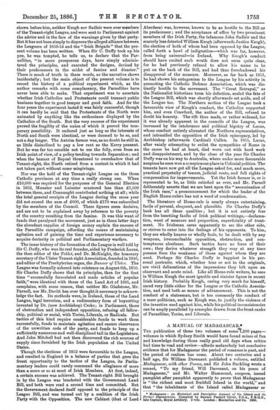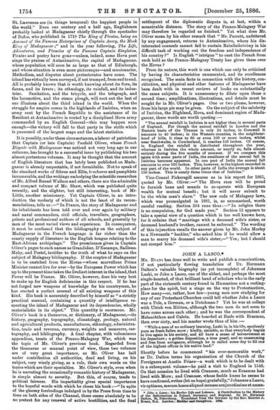A MANUAL OF MADAGASCAR.*
THE publication of these two volumes of somelt,200 pages— volumes in which Sydney Smith would have found mines of fun and knowledge during those really good old days when critics had time to read and review—affords melancholy but conclusive evidence that for Madagascar the period of romance is past, and the period of realism has come. About two centuries and a half ago, Sir William Davenant published a volume, entitled Madagascar, with other Poems, and Sir John Suckling wrote a sonnet, "To my friend, Will Davenant, on his poem of Madagascar," and Mr. Walter Hammond, surgeon, issued pamphlet after pamphlet apparently to prove that Madagascar is "the richest and most fruitful' Island in the world," and that "the inhabitants of the Island called Madagascar or * Madagascar : an Historical and Descriptive Account of the Island and its Forint:- Dependencies. Compiled by Samuel Pasfield Oliver. F.S.A., F.R.G.S., late Captain, Royal Artillery. 2 vols. London : Macmillan and Co. 1886.
St. Lawrence are (in things temporal) the happiest people in the world." Even one century and a half ago, Englishmen probably looked at Madagascar chiefly through the spectacles of Defoe, who published in 1719 The King of Pirates, being an Account of the Famous Enterprises of Captain Avery, the Mock King of Madagascar ;" and in the year following, The We, Aduentures, and Piracies of the Famous Captain Singleton. Pirates and poetry have gone—unless, indeed, some Hova poet sings the praises of Antananarivo, the capital of Madagascar, whose population will soon be as large as that of Edinburgh, and whose situation is even more picturesque—and missionaries, Methodism, and disputes about protectorates have come. The island has virtually been surveyed, if not tramped, from end to end. All is probably known that is worth knowing about its flora, its fauna, and its fevers ; its ethnology, its rainfall, and its indus- tries. Sanitation, and the tricycle, and the telegraph, and the locomotive, and the steam plough, will root out the last of our illusions about the third island in the world. When the struggle for empire comes in the highlands of Imerina, when an army sent by the French Republic to the assistance of its Resident at Antananarivo is routed by a disciplined Hova army commanded by an English General—this may happen soon enough—the victory will fall to that party in the strife which is possessed of the largest maps and the latest statistics.
It is possibly, under these circumstances, a labour of patriotism that Captain (or late Captain) Pasfield Oliver, whose French Dispute with Madagascar was noticed not very long ago in our columns, has brought to a successful issue by publishing his two almost portentous volumes. It may be thought that the amount -of English literature that has lately been published on Mada- gascar is already respectable, if not formidable. Not to speak of the standard works of Sibree and Ellis, brochures and pamphlets innumerable, and the writings embodying the scientific researches of Mr. Alfred Russel Wallace and others, there are the admirable and compact volume of Mr. Shaw, which was published quite recently, and the slighter, but still interesting, book of Mr. Little, another missionary. Yet Captain Oliver, in an intro- duction the modesty of which is not the least of its recom- mendations, tells us :—" In France, the story of Madagascar and its inhabitants has been told over and over again by military and naval commanders, civil officials, travellers, geographers, priests and professional authors of all schools, and generally by men of the most varied views and experience. In consequence, it mast be confessed that the bibliography on the subject of Madagascar in the French language is far richer than the scanty supply of literature in the English tongue relating to the East-African archipelago." The prominence given in Captain Oliver's pages to such names as Grandidier, D'Escamps, Saillens, Mahy, and Postel, testifies to the truth of what he says on the subject of Malagasy bibliography. If the sceptre of Madagascar is to be snatched from the Hovas —whose marvellous Prime Minister cannot live for ever—by the European Power which has up to the present time taken the liveliest interest in the island, that Power will be France. Mr. Oliver, however, does his very best to make up for English deficiencies in this respect. If be has not forged new weapons of knowledge for his countrymen, he has erected a perfect arsenal of all existing weapons of this kind. His book is accurately described by himself as "a strictly practical manual, containing a quantity of intelligence re- specting the island of Madagascar and its dependencies, wholly materialistic in its object." This quantity is enormous. Mr. Oliver's book is a thesaurus, or dictionary, of Madagascar,—its history, geography, topography, climatology, geology, natural and agricultural products, manufactures, ethnology, administra- tion, trade and revenue, currency, weights and measures, car- tography, and bibliography. A final chapter, with voluminous appendices, treats of the Franco-Malagasy War, which was the topic of Mr. Oliver's previous book. Regarded from the thesaurus or manual point of view, these two volumes are of very great importance, as Mr. Oliver has laid under contribution all authorities, dead and living, on his subject, very wisely giving, as a rule, their own words on the topics which are their specialties. Mr. Oliver's style, even when he is narrating the occasionally romantic history of Madagascar, is simple almost to severity. But this, of course, tends to political fairness. His impartiality gives special importance to the hopeful words with which he closes his book;—" In spite .of the gloomy forebodings indulged in by the Press from time to time on both sides of the Channel, there seems absolutely to be no pretext for any renewal of active hostilities, and the final settlement of the diplomatic dispute is, at last, within a measurable distance. The story of the Franco-Malagasy Wax may therefore be regarded as finished." Yet what does Mr. Oliver mean by his other remark that "Mr. Parrett, unfettered by any engagement, returns to Antananarivo, where his dis- interested counsels cannot fail to sustain Rainilaihriveny in his difficult task of working out the freedom and independence of his country ?" Is English " intrigue " to oust the French from such hold as the Franco-Malagasy Treaty has given them over the Hovas ?
From its nature, this work is one which can only be criticised by having its characteristics enumerated, and its excellences recognised. The main facts in connection with the history, con- stitution, and physical and other features of Madagascar have been dealt with in recent reviews of books on substantially the same subjects. It is unnecessary to dilate upon these a second time ; amplifications, illustrations, and details must be sought for in Mr. Oliver's pages. One or two plums, however, from his large pie may be given. On the subject of the salubrity of ImOrina, the Highland, Hova, and dominant region of Mada- gascar, these words are worth quoting :—
" The annual rainfall in Imerina is not higher than in several parts of England. For though the annual rainfall in London and the Eastern basin of the Thames is only 24 inches, in Cornwall it amounts to 40 inches ; in the Western counties, in the neighbour- hood of hills, it rises to 80 or even 100 or more inches, whilst near Seathwaite, in Cumberland, it reaches 165 inches. Of course, in England the rainfall is distributed throughout the year, whereas in 'merino, the whole amount, or nearly so, falls almost entirely during the five months of summer. If we compare this again with some parts of India, the smallness of the annual fall in Imerina becomes apparent. In one part of India the annual fall amounts to over 550 inches. This, however, is the highest recorded in any part of the world. In other parts of India the average is about 150 inches. This is nearly three times that of Imerina."
Vice-Consul Pickersgill assures us in his report for 1885, quoted by Mr. Oliver :—" The Hova race will be proud to furnish bone and muscle to co-operate with European wealth for mutual benefit; but it will never submit to be the white man's slave." The new code of Malagasy laws, which was promulgated in 1881, is, as summarised, worth careful reading. Section 264 runs thus :—" In religion there is no compulsion, for God made you." Section 52 appears to take a special view of a question which is too well known here, for it ordains that "marriage with a deceased wife's sister, or deceased husband's brother, cannot be enforced." The wording of this injunction recalls the answer given by Mr. John Morley to a Newcastle "heckler," who asked him if he would allow a man to marry his deceased wife's sister,—" Yes ; but I should not compel him."



































 Previous page
Previous page